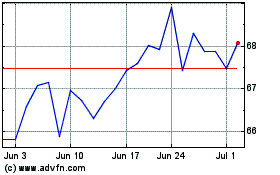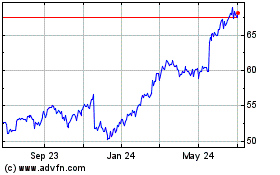WSJ Tax Guide 2019: The Retail Industry -- Journal Report
February 15 2019 - 8:29AM
Dow Jones News
As an industry that pays one of the highest average
corporate-tax rates, retailers have been one of the largest
beneficiaries of the new tax legislation, which lowered the rate to
21%.
Retailers have mostly U.S.-based operations and little
manufacturing or research and development, so they don't usually
benefit from deductions on those activities.
The tax cut could have significant effects on an industry
spending heavily to fight Amazon.com and adapt to shifting consumer
habits. Traditional retailers have generally paid higher taxes than
online retailers like Amazon.
Most retailers pushed hard in favor of the Republican tax plan
since beating back a border-adjusted tax idea included in early
proposals that would have imposed taxes on imported goods. The
majority of retailers sell large amounts of imported products, so
any such tax could have eaten away at earnings and resulted in
higher costs that retailers said would have to be passed to
consumers.
[DOWNLOAD THE E-BOOK: "The New World of Taxes: 2019"]
Since the tax overhaul passed, retailers including Walmart, Home
Depot and Lowe's have announced investments in wages,
parental-leave benefits and one-time bonuses for hourly workers,
saying the timing of some of those efforts are linked to the new
tax law. Both Lowe's and Home Depot said the new tax code would eat
into profits at first, related to the companies' plans to
repatriate offshore earnings, but it added to profits in the
following fiscal year.
Sarah Nassauer
Write to sarah.nassauer@wsj.com
(END) Dow Jones Newswires
February 15, 2019 08:14 ET (13:14 GMT)
Copyright (c) 2019 Dow Jones & Company, Inc.
Walmart (NYSE:WMT)
Historical Stock Chart
From Mar 2024 to Apr 2024

Walmart (NYSE:WMT)
Historical Stock Chart
From Apr 2023 to Apr 2024
